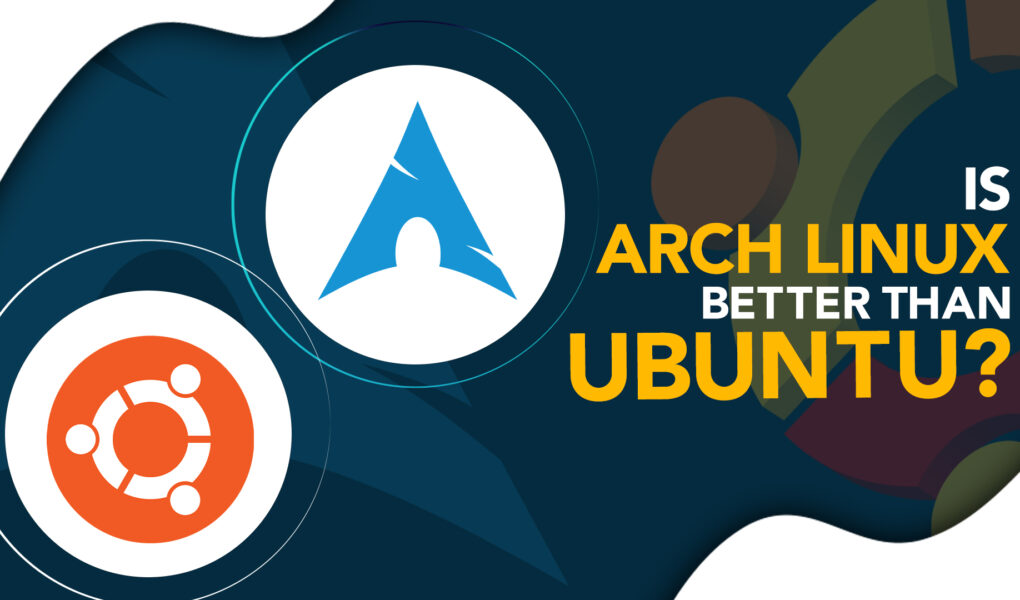If you’re new to the world of Linux, you may have heard of two popular distributions: Arch Linux and Ubuntu. Both are great choices for different reasons, but which one is better?
Arch Linux’s minimalism and focus on customization make it ideal for power users and developers. Nonetheless, Ubuntu’s ease of use and compatibility with various hardware and software render it an outstanding option for novice and casual users.
But then again, the question remains the same: is arch Linux better than Ubuntu? Or they are just two of many distributions made for different use cases. Let’s get to the answer in this article.
Arch Linux overview
“Arch Linux is a Linux distribution that is both free and open-source, intended for advanced users who desire full control over their systems. It was released in 2002 and offered good customization capabilities. As a lightweight operating system, Arch Linux best suits small businesses. By adhering to a rolling-release model, Arch Linux supplies its users with the most current and stable Linux distribution versions.
Arch Linux promotes a DIY approach, enabling users to customize their systems effortlessly. Unlike other distros, Arch Linux allows users to control package installations and avoid software bloat.
Arch Linux boasts numerous outstanding features, such as its Pacman package manager, which oversees all packages in the repositories and facilitates upgrades, removals, and downgrades.
The advantages of Arch Linux include its flexible installation process, customizable approach, and rolling-release model. However, there are some drawbacks, such as a small community due to limited users and potential bugs during package updates. Also, at times, the package manager or Pacman may work slowly.
Ubuntu Overview
Ubuntu is a modern Linux distribution derived from Debian, offering a free and open-source platform. Its creation dates back to 2004, and it is primarily designed for personal computer operating systems, but it can also be deployed in data centres. Security and release quality are key features of Ubuntu, and it can be installed on various systems, including servers, robots, and IoT devices.
Ubuntu offers many features, including a range of apps such as LibreOffice for document creation and sharing, Google Docs compatibility, and support for popular browsers. It also includes Thunderbird for email and supports other email platforms such as Gmail and Hotmail.
It is made user-friendly and offers a beautiful GNOME desktop environment for easy customization. Compared to other platforms, it provides increased security and supports safeguarding systems against virus attacks.
Just like any other operating system, Ubuntu has some weaknesses, too, such as not being a lightweight operating system, difficulty in customization, and not having as smooth of a GUI as Windows.
Key differences between Arch Linux and Ubuntu
When comparing Arch Linux and Ubuntu, it’s important to consider their differences in the following aspects.
1: Customization
- Arch Linux is highly customizable and allows users to choose only the software packages they need.
- Ubuntu comes with a wide range of pre-installed applications and features, making it a more bloated option compared to Arch Linux.
2: Release Model
- Arch Linux operates on a rolling release model, which implies that it receives constant updates with the latest software packages without necessitating a complete system upgrade.
- Ubuntu follows a set release schedule, introducing a new edition every six months, with long-term support (LTS) versions being rolled out every two years.
3: Performance
- Arch Linux is known for its speed and efficiency, with a minimalistic design and bleeding-edge software.
- Ubuntu may not perform as well on older hardware compared to some lightweight Linux distributions.
4: User Experience
- Ubuntu is designed to be easy to use and install, making it a popular choice for beginners and those who are new to the Linux world.
- Arch Linux requires more manual configuration, making it a better choice for experienced users who are willing to invest time in learning how to customize and maintain their systems.
Conclusion
Determining whether Arch Linux or Ubuntu is better eventually hinges on what features the user seeks in a Linux distribution. If you value customization, minimalism, and speed, Arch Linux may be the better choice. If you’re new to Linux and want a user-friendly interface with a wide range of pre-installed applications, you should be selecting Ubuntu then.
Ultimately, both Arch Linux and Ubuntu serve as exceptional options, contingent upon the individual requirements and inclinations of the user.



